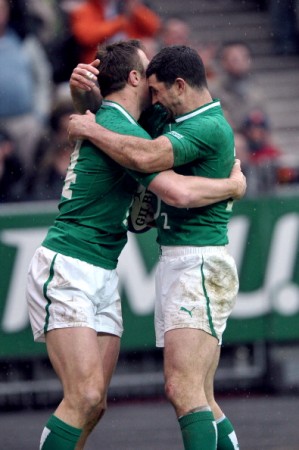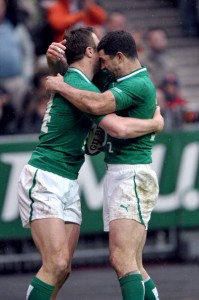By Claire Glancy
HAVING waited three weeks to get this game underway, no one playing or watching on Sunday wanted to hear the final whistle at the Stade de France – at least not until someone got that decisive last score. Of course given that Ireland were under the most pressure and in the final play of the game it was their scramble defence that saved them from another defeat in Paris, perhaps in hindsight they will be grateful for the referee’s whistle.
Afterwards both teams talked about the disappointment. For Ireland to have taken an 11-point lead into the break and then have a barren second-half, it’s understandable they feel a golden opportunity went to waste. France were frustrated that having fought back that they could not finish the job.
The first half was relatively even in terms of territory and possession but Ireland, well-structured in attack, executed their game plan almost perfectly. Buoyed with confidence after the win over Italy and having learned from defeat to Wales, the Irish weren’t intimidated by their opponents as their fast defensive line bamboozled the French players and riled their partisan support. Les Bleus are not used to being forced into pick-and-go tactics at home which was one positive captain Paul O’Connell reflected on post-match – a man who will be sorely missed for the final two games.
Defensively Ireland were too slow against Wales but Tommy Bowe’s speed and the distance he covered to intercept Aurelien Rougerie’s pass and run in for his first try shows how far they’ve come since that first weekend. With five tries in three games, Bowe is just one away from equalling the record number of tries scored in a single championship but he wasn’t Ireland’s only player to impress. Rob Kearney sweeps up everything that comes his way and although his missed tackle on Wesley Fofana proved costly, he saved Ireland by his last second heroics.
Up front,Stephen Ferris was such a tyrant that the French were literally ripping the shirt off his back in an attempt to stop him. The blindside flanker was once again Ireland’s stand out ball carrier and continually inflicted big hits on the opposition. Ferris’s contribution is undoubtedly one of the reasons that Ireland have missed fewer tackles than any other side in the tournament. In fact, at this stage of the competition Ireland have scored more tries than any other nation and only Wales have made fewer errors, making their overall position in the Championship even more frustrating.
With just a six day turnaround before the Scotland match, Ireland don’t have much time to reflect on what might have been in Paris. Now the backline are playing with confidence and the defence is going well, the line out is an area they must improve on. This will be difficult without O’Connell, particularly against a Scottish side who’ve won all of their 33 line outs to date.
Discipline also needs to improve given that Ireland conceded six penalties in the second half, the majority of which came at the breakdown. Given how strong their one-on-one tackling is and the speed of the defensive line, Ireland need to realise that they don’t need to force it at ruck time.
Having said all that the most difficult task Ireland face is playing to their potential for the whole match. In Paris, they had a great first-half and immense final ten minutes but that’s never going to be enough to beat a team that almost won the World Cup (even if they were surprising finalists). In the Heineken Cup when Munster and Leinster smell blood they usually go for the jugular but the national side seem unable to deliver the decisive blow. That killer instinct will serve the clubs well come April but first lessons need to be learned if Ireland are going to make this draw feel like a turning point for future victories.







